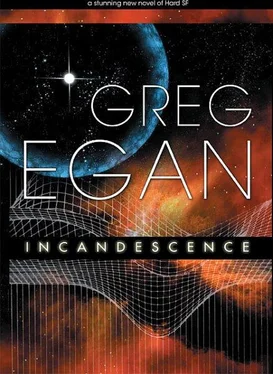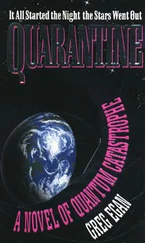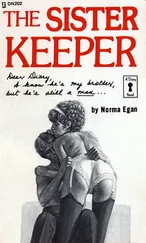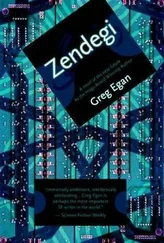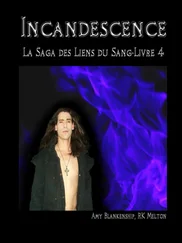If Rakesh felt naked, he had nobody but himself to blame. He'd known from the moment Lahl had offered him the key exactly how vulnerable he'd be, and he'd poured scorn on his friends' concerns. These were the terms, this was the deal; it was too late to have second thoughts. In principle, the possibilities for abuse were endless: the Aloof could be systematically torturing a billion helpless Rakesh-clones at this very moment. When he'd mentioned this primal fear to Parantham back on Massa, she'd pointed out that, while she'd regret the Aloof making anyone suffer, they could easily construct de novos of their own from scratch in order to mistreat them; sufficiently deranged sadists could always manufacture someone to torture, removing any need to lure their victims into a trap. In any case, Rakesh decided, there was nothing to be gained now from such paranoid speculation. Having handed their minds and bodies to their hosts as open books, the only sensible strategy that remained was to take their pleasant surroundings at face value and assume that the Aloof's hospitality, however narrowly defined, was genuine.
Back in the meteor room, they set to work. Rakesh had never had reason to be much of a materials scientist or ejecta expert before, and as he invoked the aid of the library the knowledge that flowed into him brought a thrill of discovery, a sense of new vistas opening up before him, that stretched far beyond his immediate needs. Imbibing a massive bolus of pre-digested information was not his usual means of educating himself — he much preferred the slow process of building incrementally on his own prior knowledge, testing and interpreting every assertion before accepting it — but there was no denying the rush of suddenly having thousands of new facts and insights jostling in his skull.
The equipment the Aloof had given them could probe the meteor's surface down to an atomic level; elicit and analyze emissions across the spectrum from gamma rays to microwaves; tomograph it in a thousand different ways; strike it, tap it, pound it, tickle it, and listen to the harmonics as it rang like a bell. Its gross chemical composition and its rarest impurities, its crystalline microstructure and the subtlest deformations thereof, were there for the asking. This rock, Rakesh thought, was as naked to them as they were to the Aloof.
He and Parantham collaborated efficiently, discussing the best strategies for the investigation, speaking a dense specialist lingo that would have been foreign to them both just minutes before. The primary interface to all of the instruments was a touch-screen console, but mercifully they weren't limited to reading the screen and tapping menus; the Aloof had tailored the interface to their detailed embodiments rather than a generic notion of the ancestral human phenotype, and the console could exchange data with the infrared ports in their fingertips.
Tomography alone was enough to locate the dead microbes, but it was necessary to send nanomachines crawling through the crevices to extract reliable DNA sequences. A dose of paleogenetic expertise from the library left Rakesh with no doubt that Lahl had been correct: these were not the corpses of any micro-organism, from any epoch, from any of the known DNA worlds. Their ancestors had probably been blasted off one of those planets billions of years before, on an entirely different piece of rock; that earlier meteor must have fallen to the ground somewhere in the bulge, and seeded a whole new biosphere. A billion or so years later this lump of basalt had been flung into the sky; with better luck it might have contributed to the DNA panspermia itself, but it was a dead seed now. At least, no pristine world could have revived these desiccated, shocked, radiation-fried microbes, though perhaps if they'd achieved the unlikely fate of landing on a planet already awash with DNA-based life, the right species of distant cousin might have scavenged a few of these corpses' gene fragments and tried them out for new ideas.
«The question now,» said Parantham, «is how do we find the parent world?»
The DNA sequences were enough to assign probabilities to the meteor's «grandparent world»: the planet out in the disk whose ejecta had seeded the world from which this rock had been blasted. Even those probabilities were not sharp, though; there were seven candidates that were almost equally likely. Given the chaotic dynamics of the bulge, this did not do much to narrow the search.
If the DNA couldn't help them, what of the rock itself? Three billion years before, lava flowing to the surface of the parent world had cooled into crystals of olivine, a magnesium-iron silicate, and augite, in which calcium, aluminum and titanium were also present. Subtle deformations in the structure of these crystals offered a partial history of the temperatures and pressures experienced by the rock since then.
The sudden heat and shock of the impact that had thrown the rock into space had left distinctive chemical fingerprints as well as physical dislocations. Over time, in the cool of the interstellar vacuum, some of the substances forged during the rock's fiery ejection had slowly decayed, hinting at a date for the event: fifty million years before. At the same time, the high-energy cosmic rays that flooded through the bulge from a myriad of sources had corroded the meteor's surface, left chemical deposits of their own, scoured tracks deep inside the rock, and created trace amounts of new isotopes. As Lahl had claimed back in the node, both lines of evidence converged on the same date: the rock had apparently drifted through the bulge, unprotected by any atmosphere or planetary magnetic field, for about fifty million years.
The same console that allowed them to control the analytic instruments provided access to a star map. When Parantham activated it, it opened with a view showing their own path and present location (labeled with a stylized picture of the habitat's ring), along with several hundred billion kilometers of the meteor's trajectory before capture (labeled just as clearly with an image of the rock). In fact, the meteor had barely been «captured» — it looked as if the habitat had been constructed around it, more or less matching its original velocity — but the map was careful to delineate between the undisturbed object and its present state.
The map labeled the stars of the region solely by their physical characteristics, and despite phrasing this information in Rakesh's language, declined to adopt the catalog numbers or coordinate system that he would normally have used. Nevertheless, by invoking the library he could match the Aloof's descriptions with his own sources. The Amalgam's maps of the bulge were somewhat patchy, but there was more than enough overlapping data to establish a reliable fit.
For the first time, now, they knew exactly where they were. They had traveled some thirteen thousand light years from Massa, and while part of that journey had taken them «west» — clockwise around the galaxy, looking down from galactic north — they had also penetrated deep into the bulge, and had ended up less than a thousand light years from the galactic center. Lahl had reached roughly the same conclusions, though she hadn't been carrying star maps of her own to compare with the Aloof's.
This central region was distinctly more crowded and violent than the outer reaches of the bulge. Packed with massive gas clouds that periodically burst into life with episodes of star formation, as well as a varied population of older stars that had drifted in from the rest of the bulge, it was as different from the galactic disk as a teeming metropolis was from a rural backwater.
Rakesh said, «Where do you think Csi and the gang are now?»
«Dead to us,» Parantham replied bluntly. «And dead to each other as well.»
Читать дальше
